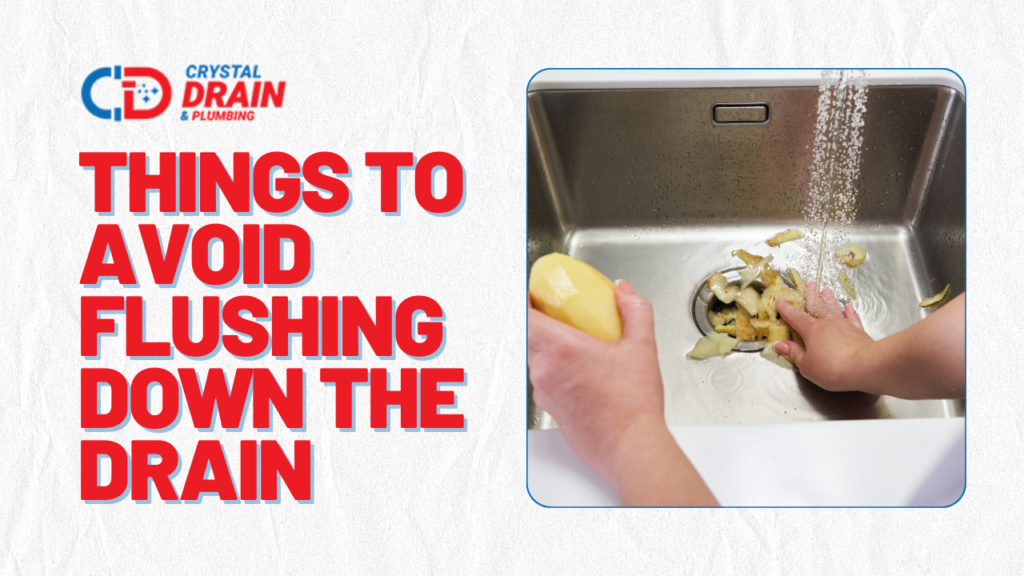- Last updated: January 15, 2025
Things to Avoid Flushing Down the Drain

Proper disposal of household waste is vital for maintaining an efficient plumbing system and avoiding costly repairs. Many common items, often flushed down sinks or toilets, can lead to significant blockages, environmental damage, and expensive plumbing fixes. This guide outlines the critical items to avoid flushing, their impacts, and how to dispose of them correctly.
Key Takeaways
- Avoid Common Clog-Causing Items: Coffee grounds, grease, and wet wipes are among the worst offenders for drain blockages.
- Environmental Consequences: Improper disposal can cause serious issues in municipal sewer systems, affecting water treatment and marine life.
- Proper Waste Disposal: Learn the best methods to dispose of hazardous materials and solid waste to protect your plumbing system.
- Routine Maintenance: Regular cleaning and professional inspections are essential to prevent plumbing issues.

Items That Should Never Go Down Your Drain
- Coffee Grounds:
While many think coffee grounds can safely be washed away, they often clump together with grease and other materials, forming resilient blockages. - Grease, Fats, and Oils:
These substances harden as they cool, leading to stubborn blockages that can severely damage pipes and sewer lines over time. - Eggshells:
The rough, granular texture of eggshells can easily combine with other debris, causing significant drainage issues. - Flushable Cat Litter:
Despite being marketed as flushable, most cat litter does not dissolve properly and can clog pipes. Additionally, it may carry harmful parasites that aren’t removed during standard water treatment processes. - Produce Stickers:
These small stickers can stick to the inside of pipes, contributing to clogs and causing disruptions in water treatment facilities. - Flushable Wet Wipes:
Wet wipes, even those labeled as flushable, do not break down easily and can bind with other materials like grease, leading to costly sewer system repairs.
The Impact of Improper Waste Disposal
Flushing inappropriate items can lead to:
- Clogs and Blockages: These can cause backups, resulting in potential damage to home interiors and costly repair bills.
- Increased Sewer Maintenance Costs: Municipal systems struggle with the cumulative effect of improper waste disposal, leading to higher taxes and service fees.
- Environmental Harm: Non-degradable items contribute to water pollution, harming marine ecosystems and affecting water quality.

How to Dispose of Problematic Waste Properly
- Solid Waste:
Dispose of solid waste items, such as coffee grounds and eggshells, in your regular trash bin. - Grease and Oils:
Collect in a container and dispose of them at designated waste disposal sites or through recycling programs if available. - Hazardous Materials:
Items like cat litter and wet wipes should be disposed of in accordance with local waste management guidelines to prevent environmental damage.
Preventive Measures and Plumbing Maintenance
To avoid costly plumbing repairs and ensure a healthy system, follow these preventive tips:
- Install Drain Guards:
Drain guards help catch solids before they enter the plumbing system, reducing the risk of clogs. - Regular Cleaning:
Keep your drains and pipes clean by regularly using safe cleaning solutions to prevent buildup. - Professional Inspections:
Schedule routine inspections with licensed plumbers to identify and address potential issues before they become major problems.
FAQs About Plumbing Maintenance
No, even small amounts of grease can solidify as they cool, leading to blockages over time. It’s best to collect grease in a container and dispose of it properly.
Even wipes labeled as flushable can cause problems because they don’t break down as quickly as toilet paper. It’s safer to dispose of all wipes in the trash.
If you suspect a clog, avoid using chemical drain cleaners as they can damage pipes. Instead, call a professional plumber to safely remove the blockage.
For most homes, an annual professional drain cleaning can prevent buildup and keep the system running smoothly. Homes with frequent issues may need more frequent cleanings.
Slow drains, frequent clogs, foul odors, and water backing up are all signs of potential plumbing problems. Addressing these early with professional help can prevent more severe issues.
Conclusion
Understanding what can and cannot be flushed down your drains is crucial for maintaining a healthy plumbing system. By adopting mindful disposal practices and scheduling regular maintenance, you can prevent costly repairs and help protect the environment. For expert plumbing services and advice, contact Crystal Drain & Plumbing.
